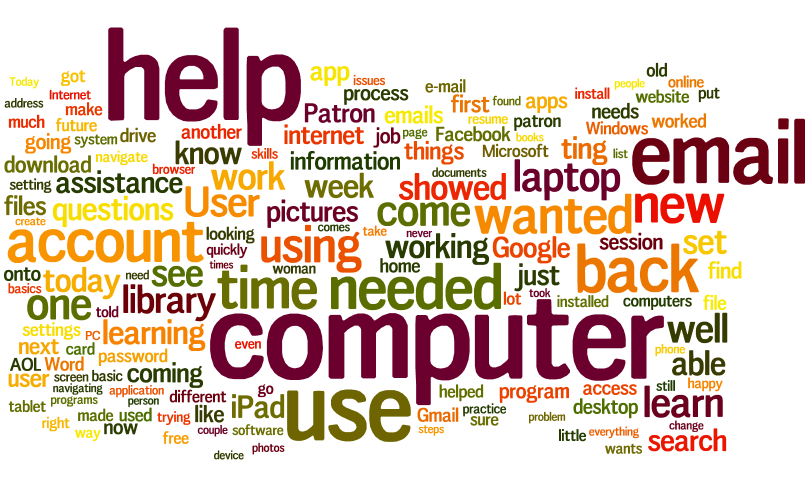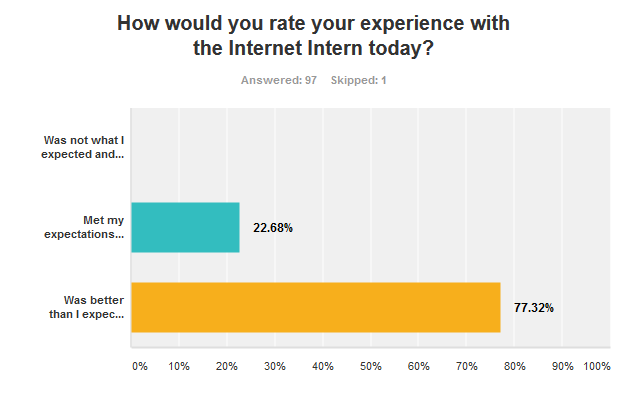The following article was submitted by Martha Reid, Vermont State Librarian. Marty will be moderating the morning panel on “Digital Literacy for a Thriving Economy” in the “Digital Divide” track of our Vermont Connected Summit on Tuesday, September 23rd. Follow this link for more information about the summit.
The Vermont Department of Libraries (VTLIB) has concluded a very successful partnership with Community College of Vermont (CCV) in implementation of the Internet Interns program, which trained CCV students to provide free one-on-one digital skills training and assistance for citizens in 24 public libraries. Through the program interns were available by appointment and for drop-in assistance approximately 6 hours each week. In general, citizen learners determined the topic(s) of instruction and the Interns responded by assisting with their learning needs, including very basic computer skills, as well as the desire to upgrade or update skills.
Survey Results from the Internet Interns Program
The interns were asked to log information about each session into a database that offers amazing data about the program’s impacts. More than 1,000 entries as of July 21 reveal:
- 365 adult learners (36%) reported that this was their first session with a CCV Intern, while 325 learners reported that they had already worked with an Intern more than 3 times (32%).
- A majority of citizen learners seeking assistance from an Intern were female (63.7%).
- Interns estimated that over 50% of the learners were over age 60. They report that more than 90% of learners are over 40 years of age.
- By far the most common way that these adult learners heard about the Internet Intern program was directly from a librarian, although “friend,” “television,” “Front Porch Forum” and “newspaper” were also cited.
- 46.4% of the learners asked for help to understand computer basics (e.g. how to use a new laptop or tablet, how to use a memory card, how to save content on a DVD).
- Email (28%) and Internet browsing/searching (27.6%) were the next top categories for assistance.
Most learners had questions in multiple categories, or discussions with their Intern led them from one topic to another. Among the other more common topics of added learning were:
- Social media use – Facebook and Twitter, in particular
- Printing documents and photos
- Organizing content in folders; saving content to portable storage devices
- Help with the Windows 8 Operating System
- Help with iPad minis, Kindle Fires and Android and Apple smart phones
- Tips on buying a tablet, laptop or PC
Internet Intern comments:
Today I showed [an individual] how to hook up his digital camera to the computer and how to [access] the pictures. He made sure to try the steps on his own three times, sometimes referring to the note sheet I created for him today, to make sure he could do it on his own at home. The notepad [with print sheets to give to learners] is very helpful, [and he] told me he keeps every single one we use so that he has his own reference notebook at home.
[The learner] said she wanted to come back to have assistance with setting up a Facebook account and to learn about the privacy control options/settings, also to learn how to use OverDrive to download eBooks to her phone. She wanted help learning how to search for reliable information regarding her [pet’s] health, as well as finding health information for herself.
[An 81 year old learner wanted] help using Microsoft Word and selecting printing options. Next time she comes in she may want help with inserting pictures into a Word document.
 Word Cloud of the words most often used in CCV Internet Intern reports on the needs of their adult learners.
Word Cloud of the words most often used in CCV Internet Intern reports on the needs of their adult learners.Library Learners
101 adult learners answered a survey between July 2013 and July 2014. They reported consistently (in agreement with what the Interns reported) that they most often sought assistance with email (48.57%), software applications (47.14%), followed by questions about social networking (e.g. Facebook).
- 100% of respondents said the experience “met or exceeded their expectations.”
- 92% reported that to continue to learn computer and Internet skills they would choose to work again with an Intern rather than take an online class (4%), or look for local computer classes (25%).
Learner Comments
Using a computer and learning new skills is empowering.
It was nice that someone was there to help me figure out the Internet problems that I was having.
[The Intern] found a way to retrieve files … an accumulation of years of email history including “stories” of loved ones who had passed on. [The Intern] took the issue seriously and found a way to make it happen. I am very grateful.
There is always something new going on, so it seems sensible to continue with classes.

Click here to download a PDF with more resources for Digital Skills Trainers and Learners.
